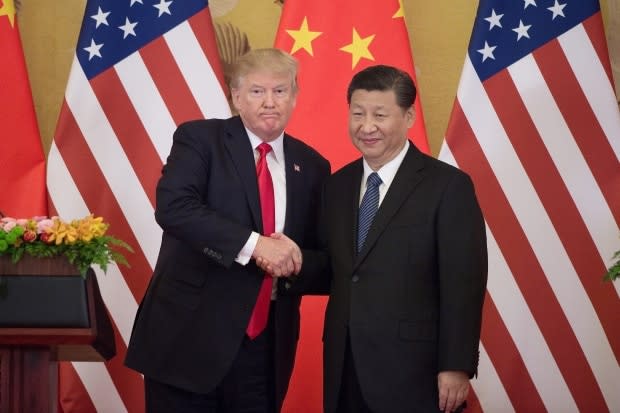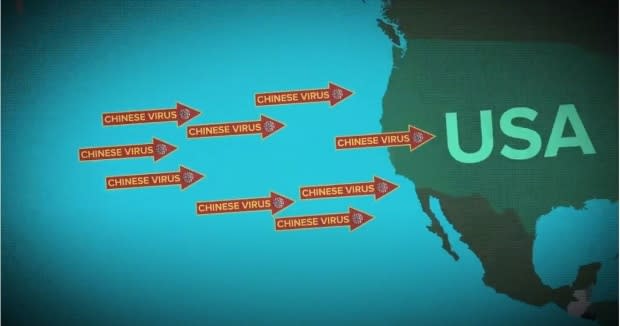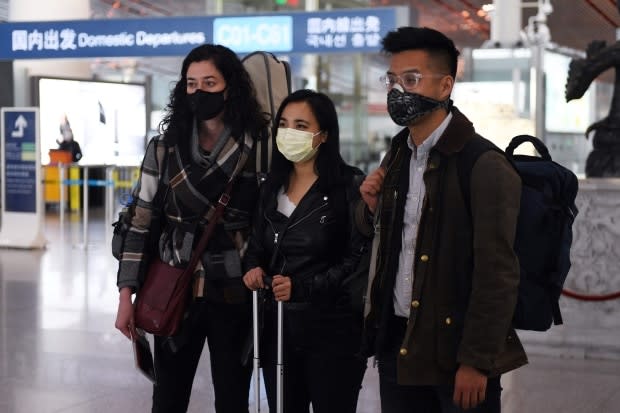COVID-19 blame game intensifies with online ad campaigns paid for by China and the U.S.

There is growing backlash toward China among some people in the U.S. for its handling of the coronavirus outbreak, and Chinese state media is pushing back with an aggressive propaganda campaign online.
Over the past few weeks, U.S. President Donald Trump has repeatedly blamed China for the pandemic, saying the country withheld information and should have stopped the virus before it spread past its borders, but perhaps it "chose not to." And China is increasingly aiming at the U.S. for bungling its own coronavirus response.
Now, the duelling campaigns are ramping up online with a series of paid ads by Chinese state media and Republicans up for election in November.
"At first, everyone was kind of scrambling to understand what was going on [with the virus] and what should be done," said Stanford researcher Vanessa Molter, who is studying China's online ad campaign.
"[But now], there is a move toward, 'Okay, this is the narrative we want to promote. Let's put it out there.'" And while scientists around the world rush to learn more about the virus and get the pandemic under control, some warn the escalating antagonism is making it harder for them to do their jobs.
A Republican election strategy
Trump ramped up his rhetoric toward China this week, calling the pandemic the "worst attack" ever on the United States.
"This is worse than Pearl Harbor. This is worse than the World Trade Center. There's never been an attack like this," he said to reporters in the Oval Office on Wednesday.
"And it should have never happened. It could have been stopped at the source. It could have been stopped in China. It should have been stopped right at the source, and it wasn't."
The White House isn't alone in pushing China for answers about its handling of coronavirus. Other countries, such as Australia, are calling for an independent investigation.
But according to a memo leaked to Politico from the National Republican Senatorial Committee, which works to elect Republicans to the U.S. Senate, it's also become a campaign strategy heading into November's presidential election.
Dozens of paid Republican ads blaming China for the coronavirus are flooding Facebook, often being used as a fundraising tool by candidates up for election, featuring links directing users to donate.

Republican Casey Askar, a Florida businessman running for Congress, released an ad on Facebook that says China "lied about the coronavirus" and "unleashed the Wuhan pandemic on the world." Texas Republican candidate Kathaleen Wall released a similar ad that begins, "China poisoned our people," and shows the virus flying across the ocean to the U.S.
In another election ad, incumbent New York Senator Anthony Palumbo suggests charging China with a terrorist offence over its coronavirus response to help businesses collect damages and reparations.
Chinese propaganda having 'a significant impact'
On the other side of the world, China is fighting back with an aggressive propaganda campaign to paint its coronavirus response as transparent and effective, and to shift the blame back onto the United States.
"Cover-up, a label China shall return to the White House," reads one of the latest Facebook ads from Chinese state media outlet Xinhua.
Xinhua has also been running this widely viewed animated video, which mocks the U.S. coronavirus response. There are dozens of other posts like it in Facebook's searchable ad library.
Watch Xinhua's video:
"At the same time that this positive image of China has been promoted, it's also that the United States might be at fault," said Molter of the Stanford Internet Observatory, which studies the negative impact of information technologies.
"But especially, that the pandemic is hitting the U.S. hard because the White House failed."
Molter says the Chinese propaganda effort has reached tens of millions of Facebook users since mid-February, and that it's beginning to rival the Russian disinformation campaign during the last U.S. election.
Stanford estimates Russia's Internet Research Agency obtained around 40 million impressions in its influence operations around the 2016 election.
"The impact is really wide reaching," she said.
It's also out in the open. Much of this propaganda is being broadcast by Chinese state media with verified accounts and millions of followers. For example, CGTN, a Chinese state news agency running some of these ads, has 100 million likes on Facebook — more than triple that of CNN.
Last summer, Twitter decided to ban all state media ads after Chinese ads against pro-democracy protesters in Hong Kong caused a backlash. Molter argues that sites such as Facebook and YouTube should follow suit.
"I think it would be a clear first step to simply say, 'We're no longer taking money from Chinese state media to spread those ads.' But that's a policy decision," she said.
Crackdown on the free press
All of these ads and statements are becoming even more influential as China cracks down on its free press, says Melissa Chan, an American journalist who reports on China and was Al Jazeera's Beijing correspondent until her press credentials were revoked by the state in 2012.
In March, Beijing revoked the credentials of journalists working in China for the New York Times, the Washington Post, and the Wall Street Journal.
"It's getting worse and worse," said Chan of the clampdown on the press.

Chan is careful to distinguish between the emerging Republican narrative and state-sponsored Chinese propaganda.
"There are some parallels, but they are fundamentally different," she said. "In the United States, you still get a variety of voices in terms of how they want to approach China. It's a messier landscape."
And while the White House messaging may seem co-ordinated, journalists and politicians still have the right to criticize it, says Chan.
"People can be taken to prison and jailed if they go against the Chinese state's message."
The origin story
A big part of the blame game between the U.S. and China revolves around how and where the virus originated. Both sides are pointing fingers at each other. During the Wuhan outbreak, a conspiracy theory emerged in China claiming an American woman was the source of the virus, contracting it after she travelled there to compete in the 2019 Military World Games.
The theory was quickly dispelled by scientists and intelligence officials around the world, but that didn't stop some Chinese officials, such as Foreign Ministry spokesperson Lijian Zhao, from spreading it online.
This week, the Chinese state media organization CCTV started running Facebook ads promoting an interview with the Chinese ambassador to the United States, Cui Tiankai, who suggested the virus may not have originated in Wuhan.
"It seems like both the United States and countries in Europe have found earlier cases than China did. We need scientists to figure that out." Cui told CCTV.
While reports this week suggested that the virus may have appeared in France in December 2019, a month earlier than previously thought, there have as yet not been indications that the virus was in Europe prior to November 2019, when the earliest case is thought to have been detected in Wuhan. Scientists have not, however, definitely identified patient zero. Meanwhile, U.S. intelligence agencies are investigating whether the virus could have accidentally escaped from a lab used to study infectious diseases in Wuhan. And while Trump has said he has a "high degree of confidence" the virus came from a Wuhan lab, his intelligence agencies have not yet reached a conclusion.
Scientists have, however, rejected conspiracy theories that the virus was "engineered" by China. Researchers who have studied its genome have found the virus is likely the product of natural evolution and made the leap from wild animals to humans just as both SARS and MERS coronaviruses did, probably as the result of close animal-human contact.
The U.S. national intelligence director's office says it "concurs with the wide scientific consensus that the COVID-19 virus was not man-made or genetically modified." It did not, however, rule out the possibility of a leak or accident.
'We have a harder time doing our jobs'
Indeed, scientists and public health officials are the ones caught in the middle of this war of words.
It affects the World Health Organization, in particular. Trump temporarily suspended U.S. payments to the agency while a review of its response to the pandemic is underway. He called the WHO "very China-centric."
"The WHO often gets caught up in geopolitical tensions," Keiji Fukuda, a former top official at the WHO and the U.S. Centers for Disease Control and Prevention, said in an interview with CBC News.
"But this time ... there's a corrosiveness that's not usually there."
Watch: Fukuda speaks with CBC's Wendy Mesley about politics and the coronavirus:
Fukuda says it's legitimate to question what happened in the early days of the coronavirus outbreak, and that identifying the origin of the coronavirus is important. But he would prefer to see an investigation come after the pandemic is under control.
If the U.S. and Chinese leaders are blaming each other to rally their bases and politicize the pandemic, it may help them, he says.
"But if the intent is really to deal with the outbreak, which is what the public should hold leaders accountable for, then it's not helping."
Fukuda says scientists already have a tough enough job trying to get the facts right about a virus nobody's seen before.
"When you put the political overtones on top of that ... scientists around the world have to worry about what it is that they say and how they present it," he said.
"We have a harder time doing our jobs, and that's to everybody's detriment."


